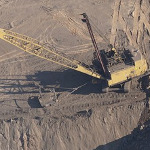Nuclear Waste Policy: Defining the Problem, Searching for Solutions
 The Council of State Governments has posted a two-part series of on-demand webinars exploring the status of nuclear waste management in the United States, with a focus on how the lack of a disposal facility affects electricity customers, the communities that are home to nuclear power plants, and the utilities that own and operate the plants.
The Council of State Governments has posted a two-part series of on-demand webinars exploring the status of nuclear waste management in the United States, with a focus on how the lack of a disposal facility affects electricity customers, the communities that are home to nuclear power plants, and the utilities that own and operate the plants.
Both parts of the series are available on the Council’s website. Part one is here.
The Nuclear Waste Policy Act of 1982 established a national program for the safe, permanent disposal of highly radioactive waste. In 2002, Congress approved a site at Nevada’s Yucca Mountain; however, that project was stalled and defunded in 2010. Consequently, there currently is no disposal facility in the United States for spent fuel rods from 99 operating commercial nuclear reactors across the country.

 Twenty-four states are suing to block the Obama administration from implementing its new clean power regulations — the cornerstone of a promise that the United States will reduce greenhouse gas emissions to limit global warming, but some Texas energy companies are not as unanimous in their opposition. That’s because Texas’ energy sector is transforming rapidly,
Twenty-four states are suing to block the Obama administration from implementing its new clean power regulations — the cornerstone of a promise that the United States will reduce greenhouse gas emissions to limit global warming, but some Texas energy companies are not as unanimous in their opposition. That’s because Texas’ energy sector is transforming rapidly,  The rise of local bans on hydraulic fracturing, or “fracking,” by local governments has sparked a recent backlash in carbon-producing states, writes
The rise of local bans on hydraulic fracturing, or “fracking,” by local governments has sparked a recent backlash in carbon-producing states, writes